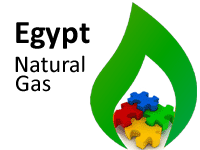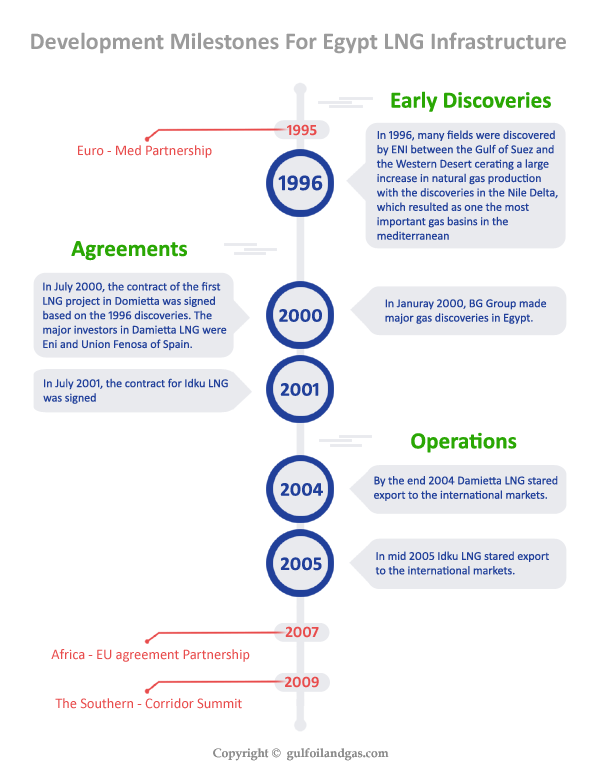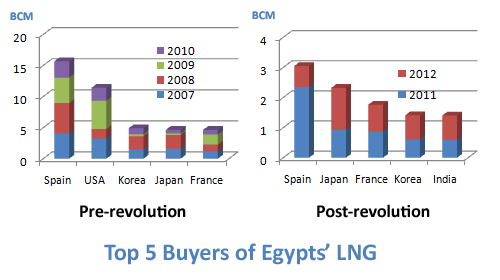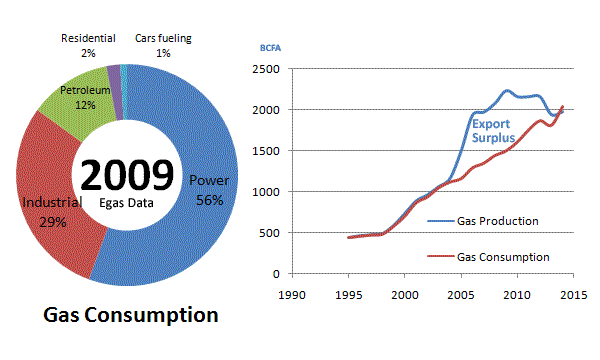Egypt Gas Puzzle: Who is Fighting over Egypt's Natural Gas?Source: Gulfoilandgas.com - Articles 3/20/2014, Location: Egypt |
|
|
|
|
 This is the second in a series of articles about "Egypt Gas Puzzle". The abandoned Natural Gas Export Infrastructure in Egypt, was described in the first article of the series. In the post revolution era, the reform of energy subsidies, coupled with the shortage in gas supply and increase in local demand has created an unprecedented challenge for Egypt's interim government. Today, there are Four main groups fighting over Egypt’s Natural Gas. The first group includes European countries. The second group includes East-Med neighboring countries. The third group includes Egyptian power generation companies. The fourth and last group includes Egyptian business tycoons. In this article, we analyze the different local and foreign groups who want Egypt’s Natural Gas.
Europe: Gas Supply Security is the Name of the Game European countries have always been engaged in very deep discussion and consideration over Europe Natural Gas supply security. Europe Gas supply security paved the way for building Egypt's LNG export facilities. To realize the ambitious natural gas development plans in Egypt, European IOCs and energy companies led the campaign to build the LNG export infrastructure in Egypt. They also invested heavily in deep offshore exploration blocks in the Mediterranean to support the export plans. European countries/players are long-term LNG buyers and major investors in Egypt's LNG infrastructure. Investors in the LNG infrastructure are able to secure supply for their countries in case gas imports are needed in the future. The history of Natural Gas export in Egypt can be traced back to at least 20 years ago and involve important political events - during Mubarak’s ruling - addressing Europe Gas supply security in the region. November 1995, marked the launch of the Euro-Mediterranean Partnership (EUROMED) which acknowledged the pivotal role of the energy sector in the economic Euro Mediterranean partnership and created the framework conditions for investments and cooperation between Egypt and energy companies. The European partnership forged the way to attract investments in deep water exploration activities and LNG export infrastructure in Egypt. December 2007, marked the launch of the Africa-EU Partnership Agreement on Energy which addressed the need for developing the Africa-EU dialogue on energy access and energy security and promoting the development of energy interconnections between Africa and Europe. The partnership emphasized the importance of European investments in energy infrastructure in Africa and the development-oriented use of oil and gas generated resources. The Southern Corridor Summit 2009: In January 2009, Gazprom cut off all supplies to 18 European countries after weeks of negotiations with Ukraine on outstanding debts and prices for 2009. Europe receives 80 percent of its Russian gas, a fifth of its total needs at that time, from pipelines crossing Ukraine. Following the gas crisis between Russia and Ukraine, the Southern Corridor Summit was held in Prague on 8th May 2009, to address the need for the diversification of supply sources to Europe and reduce dependence on Russia. The summit was held approximately Two years before the full manifestation of the Egyptian gas crisis. Sameh Fahmy, the Egyptian Minister of Petroleum at that time agreed to cooperate with the EU on specific projects in developing Egypt's gas reserves and export potential for the EU, including via the Southern Corridor and encouraging energy investment. The Ukraine crisis made the EU to again pay attention to the supply of gas in the liquefied form (LNG), since this methods enables diversification of sources and routes of supply.  Major European LNG players in Egypt: Spain is the largest buyer of LNG from Egypt and is highly dependent on Egypt for the procurement of up to 20% of its LNG needs. Spain is also a major investor in Segas LNG and own 40% of the project shares. Additional suppliers of LNG cargoes to Spain include Algeria, Nigeria, Norway, Peru, Qatar, and Trinidad & Tobago. Spain is the country most affected by the interruption of LNG supply from Egypt. France buys LNG cargoes from Egypt in addition to Algeria, Nigeria, Norway and Qatar. France dependent on Egypt for the procurement of up to 10% of LNG. Also, GDF-Suez of France owns a minority stake of 5% in Idku LNG.  The UK’s BG Group is responsible for around a third of all gas produced in Egypt. BG Group is a major shareholder in Idku Egyptian LNG and own 35.5% stake in the project. In January 2014, BG Group has issued Force Majeure notices under its LNG agreements in Egypt reflecting the ongoing diversions of gas volumes to the domestic market in excess of the existing pooling arrangements. The UK do not depend currently on Egypt for LNG procurement and buy most of its LNG needs from Qatar. The UK is trying to secure southern supply sources and routes in case gas imports are needed in the future. Eni of Italy owns a 40% stake in Segas LNG. Italy purchases large quantities of pipeline gas and is less dependent on LNG. Similar to the UK, Italy want to secure supply sources in case gas imports are needed in the future. East-Mediterranean Neighboring Countries The Arab Gas Pipeline is the supply route for the East-Mediterranean countries in this group. The 1,200 km pipeline was constructed to export Egyptian natural gas to Jordan, Syria and Lebanon, with a separate line to Israel. Gas export from Egypt to Israel was backed by the United States as part of the normalization of relations between Egypt and Israel. Israel's newfound energy abundance represents a major strategic change. The amount of gas discovered exceeds projected Israeli demand for at least 50 years. As such, Israel will become a net exporter of gas. It is also important to note that the United States used to be a large buyer of LNG from Egypt. However, with the recent explosion of shale gas production in the United States, LNG from Egypt is no longer needed. On the other hand the reduction in the quantities of gas exported from Egypt, forced Jordan to import expensive fuel products causing its energy bill to spike. The gas export agreement with Jordan stipulates that Jordan would receive 240 mcf of natural gas per day. Gas supply from Egypt to Jordan is completely halted at present. The new pipeline planned from Basra in Iraq to Aqaba in Jordan is expected to address the gas shortage problem and provide a long term solution for Jordan. Gas finds in east Mediterranean may change strategic balance and solve Lebanon problems in the long-term. In the past, Egypt produced all the natural gas consumed in Lebanon, and around 13% of the gas needed in Syria. Egyptian Power Generation Companies The power sector is the largest gas consuming sector where gas consumption during 2008/2009 has reached 815 BCF representing 55.6% of local natural gas consumption according to EGAS. The power shortfall in Egypt has been caused by declining natural gas production which has restricted the government’s ability to contain the problem.  Egyptian Business Tycoons The Industry sector's (Fertilizer – Cement– Iron & Steel and Other industries) gas consumption during 2008/2009 has reached 427 BCF representing 29.1% of local natural gas consumption. The cement sector in Egypt has the largest natural gas consumption after the power sector. In 2008, the Government increased substantially the price of natural gas and electricity to energy intensive industries. The subsidy reform had been prepared with the objective of reaching full cost recovery by 2014. With respect to the local market, the Egyptian cement industry has been growing sharply, on the back of the high growth in the real estate sector. Despite the global financial crisis, demand for Egyptian cement continued its increase fueled by low natural gas prices. Egypt’s cement production capacity is around 50 million tons per year. The Egyptian cement sector consists of 13 manufacturers, of which 9 companies are controlled by 6 multinational companies. Top players in this sector are Italcementi of Italy, Lafarge of France and ASEC Cement of Citadel Capital in Egypt
Conclusion Understanding the fight over Egypt's gas reveals many important aspects about the root cause of the Energy crisis in Egypt. The origins of Egypt's Gas Puzzle are therefore contributed to 1) lack of transparency, 2) absence of a clear role for the civil society, 3) lack of a comprehensive national Energy strategy focusing on the people, 4) foreign geopolitical interests in dominating the energy corridors of the Middle East and North Africa, and 5) business tycoons’ interests in short-term profits. The post-revolution era is a golden opportunity for change. Egyptians should learn from the past to create a better future. Without a clear vision about what to do to fix the "inherited mess", the Egyptian people will always end up losing. Articles in the Egypt Gas Puzzle series:
|
|
 |
|||||
|
Oil Egypt E-Marketplace - Subscription Packages - Benefits |
||
|